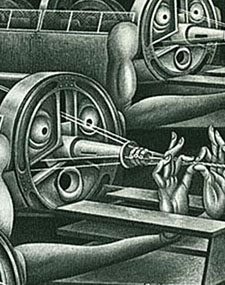Brian Rotman: Becoming Beside Ourselves: The Alphabet, Ghosts, and Distributed Human Being (2008)
Filed under book | Tags: · affect, alphabet, body, computing, gesture, god, language, mathematics, networks, posthuman, representation, self, semiotics, speech, subjectivity, technology

Becoming Beside Ourselves continues the investigation that the renowned cultural theorist and mathematician Brian Rotman began in his previous books Signifying Nothing and Ad Infinitum…The Ghost in Turing’s Machine: exploring certain signs and the conceptual innovations and subjectivities that they facilitate or foreclose. In Becoming Beside Ourselves, Rotman turns his attention to alphabetic writing or the inscription of spoken language. Contending that all media configure what they mediate, he maintains that alphabetic writing has long served as the West’s dominant cognitive technology. Its logic and limitations have shaped thought and affect from its inception until the present. Now its grip on Western consciousness is giving way to virtual technologies and networked media, which are reconfiguring human subjectivity just as alphabetic texts have done for millennia.
Alphabetic texts do not convey the bodily gestures of human speech: the hesitations, silences, and changes of pitch that infuse spoken language with affect. Rotman suggests that by removing the body from communication, alphabetic texts enable belief in singular, disembodied, authoritative forms of being such as God and the psyche. He argues that while disembodied agencies are credible and real to “lettered selves,” they are increasingly incompatible with selves and subjectivities formed in relation to new virtual technologies and networked media. Digital motion-capture technologies are restoring gesture and even touch to a prominent role in communication. Parallel computing is challenging the linear thought patterns and ideas of singularity facilitated by alphabetic language. Barriers between self and other are breaking down as the networked self is traversed by other selves to become multiple and distributed, formed through many actions and perceptions at once. The digital self is going plural, becoming beside itself.
With a Foreword by Timothy Lenoir
Publisher Duke University Press, 2008
ISBN 0822342006, 9780822342007
176 pages
Commentary (Ben Pritchett, Mute)
Review (Stevan Harnad, Times Literary Supplement)
Amodern 2: Network Archaeology (2013)
Filed under journal | Tags: · aesthetics, interface, media archeology, networks

“This special issue of Amodern features original research, initially presented in 2012 at the Network Archaeology conference at Miami University of Ohio, on the histories of networks, the discrete connections that they articulate, and the circulatory forms of data, information, and socio-cultural resources that they enable. Drawing from the field of media archaeology, we conceptualize network archaeology as a call to investigate networks past and present – using current networks to catalyze new directions for historical inquiry and drawing upon historical cases to inform our understanding of today’s networked culture. In this introduction, we elaborate how network archaeology opens up promising areas for critical investigation, new objects of study, and prospective sites for collaboration within the productively discordant approach of media archaeology.” (from the Editorial)
With contributions by Braxton Soderman, Nicole Starosielski, Jussi Parikka, Scott Pound, Alan Liu, John Cayley, Adrian Johns, John Cayley, Rory Solomon, Liam Young, Lisa Gitelman, Brian Jacobsen, Veronica Paredes, Shannon Mattern, James Purdon, Sebastian Gießmann, Brooke Belisle, Peter Schaefer, Alex Ingersoll, John Shiga, Kris Paulsen, Sandra Gabriele, Darren Wershler, Kalervo Sinervo, and Shannon Tien.
Edited by Nicole Starosielski, Braxton Soderman and cris cheek
Publisher Concordia University and Lakehead University, October 2013
Media archaeology at Monoskop wiki
View online (HTML articles)
Comment (0)Amodern 1: The Future of the Scholarly Journal (2013)
Filed under journal | Tags: · academia, humanities, networks, publishing, research, technology

Amodern is a new peer-reviewed, open access scholarly journal devoted to the study of media, culture, and poetics. Its first issue is devoted to a critical conversation about the future of the scholarly journal.
With contributions by Scott Pound, Michael Nardone and Kathleen Fitzpatrick, Scott Pound and Jerome J. McGann, Johanna Drucker, Benjamin J. Robertson, Gary Genosko, and Nick Montfort.
Editors: Scott Pound, Darren Wershler
Managing Editor: Michael Nardone
Publisher Concordia University and Lakehead University, February 2013
View online (HTML articles)
Comment (0)
